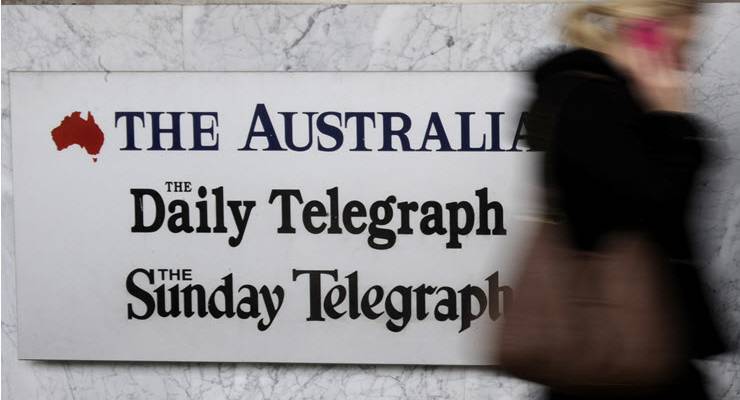
Whatever was the truth regarding Geoffrey Rush’s behaviour towards Eryn Jean Norvill, and whether his victory — now upheld by the full court of the Federal Court on appeal — accords with that truth, one thing has throughout this awful saga been true: The Daily Telegraph deserved to lose.
Rush had won his defamation case handsomely; the damages award of $2.9 million is an Australian record. The Telegraph appealed, and lost every single appeal point in a unanimous judgment.
When the appeal was first launched, all of the excitement was about its unusual claim that the trial judge, Justice Michael Wigney, had held an “apprehended bias” against the Telegraph, tainting his conduct of the trial and ultimate verdict. At the appeal hearing, it was dropped altogether, a non-starter.
The first ground of appeal was easy to dismiss: the Telegraph’s claim that its articles about the allegations against Rush did not paint him as a “pervert”.
Given that the front page was an image of Rush looking particularly creepy under the headline “KING LEER”, that was a long shot. And it failed; apart from the headline, the articles had clearly labelled Rush as a sexual predator.
The most important appeal point was about Wigney’s assessment of the witnesses: who he believed.
This was the basis on which the Telegraph’s main defence — that the defamatory allegations were factually true — had failed. It came down to the judge’s disbelief of the alleged victim, Norvill.
I have written before about my issues with the trial judge’s approach to this question. For the appeal court, the question is quite different: as it does not have the trial judge’s advantage of seeing the witnesses give their evidence, the governing principle is that it should not interfere in the judge’s findings of credit without good reason.
After an exhaustive analysis, in the course of which (thankfully at least) the appeal judges said that Wigney had been wrong to criticise Norvill for saying nice things about Rush during press conferences at the same time as he was allegedly molesting her, the full court concluded that Wigney’s belief that Norvill was not a reliable witness had a sufficient basis to be left as it is.
Finally, there was Witness X (Yael Stone). Wigney had rejected a late attempt by the Telegraph to introduce her evidence regarding separate (but similar) alleged sexual harassment and indecencies she said Rush had perpetrated on her. The full court upheld that outcome; basically, they’d brought it on too late.
And that is the whole story of this godforsaken case: lousy timing. The Telegraph’s work was consistently bad; it created its own mess and then spent years and millions of dollars floundering in it.
When the Telegraph decided to run the Rush story, the Me Too movement was just gathering momentum in Australia. Harvey Weinstein and Kevin Spacey had fallen, and practically every journalist in Australia was gathering disclosures from victims of his local equivalents. A huge exposé
on TV personality Don Burke, alleging dozens of incidents of harassment and bullying, had run only four days before the Telegraph went to print.
The truth is that, at the time, many media organisations had a queue of investigations into prominent men, in various stages of preparation, and the stage was well set for a long rollout of Weinstein-like reports.
The Telegraph, apparently, did not want to miss out. So, although what it had on Rush was woefully inadequate, it went with that. Being the Telegraph, it went hard.
The fundamental problem was that the newspaper did not have the victim. Norvill had not agreed to the story being run, had not wanted it to be run.
The Telegraph had done none of the work that a journal of any integrity or ethics would do as a minimum before going to print. All it had was a second-hand report of an informal complaint, a high-profile target and a catchy headline.
The response of the Telegraph’s editor, Ben English, to the appeal loss, was a fresh outrage:
…we are very disappointed that the appellate court did not reverse Justice Wigney’s findings as to the credibility of Eryn Jean Norvill or [his] decision to exclude the testimony of Yael Stone. We support both women in their decision to share their complaints.
Okay. First, Norvill was not the Telegraph’s heroine, she was its victim. She was dragged unwillingly into the case, as the Telegraph tried desperately to bootstrap its hopeless defence of truth by co- opting her testimony.
Secondly, Stone chose to disclose her story to the ABC and The New York Times, a telling-enough reflection of how she viewed the Telegraph’s integrity.
The Telegraph is right in saying that the Rush case underlines the urgent need for defamation law reform. However, it has no standing to say so.
Nobody came out of the case well, least of all Norvill. Her tragedy is unspeakable. It is as well that the financial loss will all fall on the Telegraph and the Murdoch empire that publishes it. It is the least that they deserve for their failure to follow the most basic principles of journalism and the incalculable harm their recklessness has done to the cause of exposing and ending systemic sexual violence perpetrated by men in positions of power.
As recent events have amply demonstrated, it’s not like the predators have gone away.








Crikey encourages robust conversations on our website. However, we’re a small team, so sometimes we have to reluctantly turn comments off due to legal risk. Thanks for your understanding and in the meantime, have a read of our moderation guidelines.